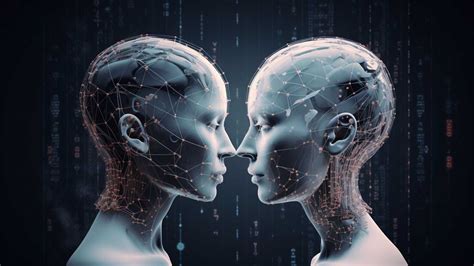Understanding Artificial Intelligence (AI)
AI refers to computer systems designed to perform tasks that typically require human intelligence, such as learning, problem-solving, decision-making, and natural language processing. Advanced algorithms and machine learning techniques fuel AI systems, enabling them to improve their performance over time as they gain experience.

Benefits of AI
AI offers numerous advantages to businesses and individuals alike:
- Automation: AI handles repetitive and time-consuming tasks, freeing up human workers for more complex and creative endeavors.
- Efficiency: AI systems work 24/7, processing vast amounts of data quickly and accurately, leading to increased productivity.
- Personalization: AI tailors experiences based on individual preferences and behaviors, delivering highly relevant content and services.
- Insight Generation: AI analyzes data to uncover patterns, trends, and insights that inform decision-making.
Types of AI
AI applications vary widely, covering a wide spectrum of capabilities:
- Machine Learning: AI systems learn from data without explicit programming, adapting to new situations and improving their performance over time.
- Natural Language Processing: AI enables computers to understand, interpret, and generate human language, facilitating communication between humans and machines.
- Computer Vision: AI systems “see” and interpret images and videos, providing insights into visual content.
- Expert Systems: AI simulates human expertise in specific domains, offering advice and recommendations based on accumulated knowledge.
Applications of AI
AI is revolutionizing various industries, transforming the way we live and work:
- Healthcare: AI assists in disease diagnosis, drug discovery, and personalized treatment plans.
- Finance: AI automates fraud detection, risk assessment, and investment management.
- Retail: AI personalizes shopping experiences, enhances inventory management, and optimizes supply chains.
- Education: AI powers adaptive learning platforms, virtual assistants, and educational content creation.
- Automotive: AI enables self-driving cars, traffic management, and predictive maintenance.
- Agriculture: AI optimizes crop yields, monitors livestock health, and improves resource utilization.
Challenges of AI
While AI offers immense potential, it also presents certain challenges:
- Data Privacy and Security: AI systems rely on vast amounts of data, raising concerns about privacy and data misuse.
- Job Displacement: Automation by AI may lead to job losses in certain industries, requiring retraining and workforce adaptation.
- Ethical Concerns: AI systems can exhibit biases and make unfair decisions, highlighting the need for ethical considerations.
The Future of AI
AI is poised to continue its transformative journey, with exciting developments expected in the coming years:
- Autonomous Decision-Making: AI systems will become increasingly capable of making decisions without human intervention.
- Human-AI Collaboration: AI will work alongside humans, augmenting their capabilities and fostering innovation.
- Quantum AI: Quantum computing will empower AI with enhanced processing capabilities and faster problem-solving.
Creating a New Word to Describe AI’s Impact: “Intelligious”
Combining “intelligence” and “ingenious,” the word “intelligious” captures the unique blend of capabilities offered by AI. This term highlights AI’s ability to learn, adapt, and solve problems in ways that mimic human intelligence while also demonstrating creativity and innovation.
Useful Tables
| Table 1: AI Market Size and Projections |
|—|—|
| Year | Market Size |
| 2021 | $387.45 billion |
| 2026 | $1,394.31 billion |
| Growth Rate | 29.1% (CAGR) |
| Table 2: AI Applications and Industries |
|—|—|
| Application | Industry |
| Natural Language Processing | Healthcare, Customer Service |
| Machine Learning | Finance, Marketing |
| Computer Vision | Automotive, Security |
| Expert Systems | Legal, Manufacturing |
| Table 3: Challenges of AI |
|—|—|
| Challenge | Concern |
| Data Privacy | Misuse of personal data |
| Job Displacement | Loss of employment due to automation |
| Ethical Considerations | Biased or unfair decisions |
| Table 4: Benefits of AI |
|—|—|
| Benefit | Impact |
| Automation | Increased productivity |
| Efficiency | Improved accuracy and speed |
| Personalization | Tailored experiences |
| Insight Generation | Data-driven decision-making |
Effective Strategies for AI Implementation
- Identify Clear Business Objectives: Align AI implementation with specific business goals.
- Secure and Manage Data: Establish robust data privacy and security protocols.
- Upskill Your Workforce: Train employees to work alongside AI and leverage its capabilities.
- Monitor and Evaluate Performance: Track AI performance and make adjustments as needed.
Frequently Asked Questions (FAQs)
Q: Is AI a threat to human jobs?
A: While AI may automate certain tasks, it also creates new jobs and opportunities that require human creativity and problem-solving skills.
Q: How can I incorporate AI into my business?
A: Start by identifying areas where AI can enhance your operations or create new value. Seek expert advice and invest in training to ensure successful implementation.
Q: What are the ethical implications of AI?
A: AI systems must be developed and deployed with transparency, accountability, and fairness in mind. Ethical considerations are crucial to prevent bias and promote responsible use.
Q: How can I keep up with the latest AI advancements?
A: Stay informed through industry news, attend conferences, and participate in online learning platforms to expand your knowledge and skills.
Q: What is the future of AI?
A: AI is expected to become increasingly integrated into our lives, empowering humans to solve complex problems, improve efficiency, and create a more interconnected world.
Conclusion
AI holds immense promise for transforming the way we live and work. By understanding its capabilities, applications, and challenges, businesses and individuals can harness the power of AI to drive innovation, improve decision-making, and shape a more intelligent future. As
